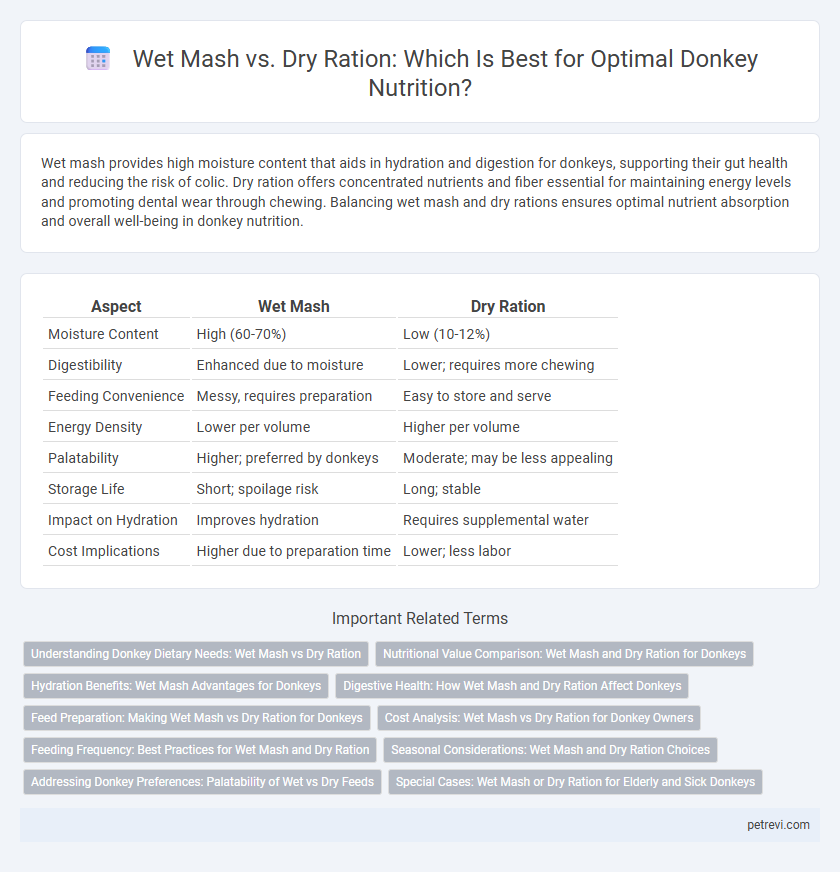Wet mash provides high moisture content that aids in hydration and digestion for donkeys, supporting their gut health and reducing the risk of colic. Dry ration offers concentrated nutrients and fiber essential for maintaining energy levels and promoting dental wear through chewing. Balancing wet mash and dry rations ensures optimal nutrient absorption and overall well-being in donkey nutrition.
Table of Comparison
| Aspect | Wet Mash | Dry Ration |
|---|---|---|
| Moisture Content | High (60-70%) | Low (10-12%) |
| Digestibility | Enhanced due to moisture | Lower; requires more chewing |
| Feeding Convenience | Messy, requires preparation | Easy to store and serve |
| Energy Density | Lower per volume | Higher per volume |
| Palatability | Higher; preferred by donkeys | Moderate; may be less appealing |
| Storage Life | Short; spoilage risk | Long; stable |
| Impact on Hydration | Improves hydration | Requires supplemental water |
| Cost Implications | Higher due to preparation time | Lower; less labor |
Understanding Donkey Dietary Needs: Wet Mash vs Dry Ration
Donkeys require a diet high in fiber and low in sugar to mimic their natural grazing habits, making wet mash and dry ration distinct in their nutritional offerings. Wet mash, composed of soaked grains and forage, enhances digestibility and hydration but can lead to overconsumption if not carefully managed. Dry ration, consisting mainly of hay and dry feed, supports dental health and natural chewing behavior, helping maintain digestive equilibrium essential for donkey wellbeing.
Nutritional Value Comparison: Wet Mash and Dry Ration for Donkeys
Wet mash provides higher moisture content and improved palatability, enhancing digestion and nutrient absorption in donkeys, while dry rations offer concentrated energy and fiber essential for maintaining optimal health. Wet mash typically contains more readily available vitamins and minerals due to the inclusion of fresh ingredients, whereas dry rations ensure consistent nutrient supply with longer shelf life and ease of storage. Balancing both wet mash and dry rations supports robust equine nutrition by maximizing nutrient bioavailability and supporting hydration needs.
Hydration Benefits: Wet Mash Advantages for Donkeys
Wet mash provides essential hydration benefits for donkeys by increasing water intake through moist feed, which supports digestion and overall health. This feeding method reduces the risk of dehydration and colic by maintaining optimal fluid balance in the digestive tract. In contrast, dry rations may contribute to lower water consumption, potentially compromising hydration status and digestive efficiency.
Digestive Health: How Wet Mash and Dry Ration Affect Donkeys
Wet mash enhances digestive health in donkeys by providing higher moisture content, which aids in proper fermentation and nutrient absorption within the hindgut. Dry rations, while convenient, can lead to dehydration and reduced gut motility if not supplemented with adequate water intake. Consistent feeding of wet mash supports optimal microbial balance, reducing the risk of colic and other digestive disorders in donkeys.
Feed Preparation: Making Wet Mash vs Dry Ration for Donkeys
Wet mash preparation for donkeys involves soaking grains and fibrous materials in water to create a moist, easily digestible feed that enhances nutrient absorption and reduces dust inhalation. Dry ration consists of unprocessed or minimally processed feed components like hay, straw, and grains given in their dry form, which may require more chewing effort and saliva production to aid digestion. Proper feed preparation tailored to donkey health includes ensuring wet mash is fresh and balanced, while dry rations must be free from mold to prevent respiratory or digestive issues.
Cost Analysis: Wet Mash vs Dry Ration for Donkey Owners
Wet mash for donkey nutrition often involves higher initial costs due to water usage and preparation time but can enhance feed digestibility and nutrient absorption. Dry rations generally offer lower upfront expenses and easier storage, providing a cost-effective solution for long-term feeding. Donkey owners should evaluate local feed prices, labor availability, and water access to determine the most economical feeding strategy.
Feeding Frequency: Best Practices for Wet Mash and Dry Ration
Feeding frequency for donkeys varies between wet mash and dry ration diets, requiring careful management to maintain digestive health. Wet mash should be offered multiple times daily in smaller portions to prevent fermentation issues and ensure proper hydration, while dry rations are best fed two to three times a day to avoid overloading the digestive system. Consistent feeding intervals and monitoring individual donkey responses optimize nutrient absorption and overall well-being.
Seasonal Considerations: Wet Mash and Dry Ration Choices
Seasonal variations significantly influence the choice between wet mash and dry ration for donkey nutrition, with wet mash preferred during hotter months to enhance hydration and digestion. In colder seasons, dry rations provide concentrated energy and nutrients essential for maintaining body temperature and weight. Effective feeding strategies adjust mash moisture content and ration composition according to temperature fluctuations and forage availability.
Addressing Donkey Preferences: Palatability of Wet vs Dry Feeds
Donkeys exhibit a marked preference for wet mash due to its higher moisture content and softer texture, which enhances feed palatability and encourages consistent intake. Wet mash provides better digestibility and nutrient absorption compared to dry rations, which can be less appealing and harder to chew for donkeys. Ensuring feed palatability by offering wet mash can improve overall nutritional status and prevent feed refusal in donkeys.
Special Cases: Wet Mash or Dry Ration for Elderly and Sick Donkeys
Wet mash provides superior hydration and easier digestibility, crucial for elderly and sick donkeys experiencing dental issues or reduced saliva production. Dry rations may cause constipation and decreased nutrient absorption in compromised donkeys, making wet mash more effective for maintaining optimal health and energy levels. Careful formulation of wet mash with balanced fiber, protein, and minerals supports recovery and enhances feed intake in special cases.
Wet Mash vs Dry Ration for Donkey Nutrition Infographic

 petrevi.com
petrevi.com